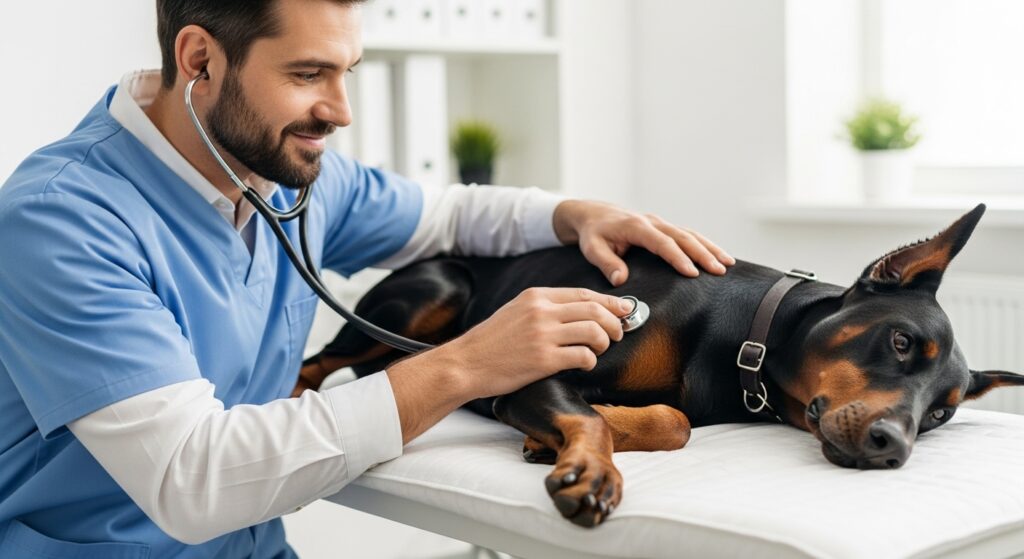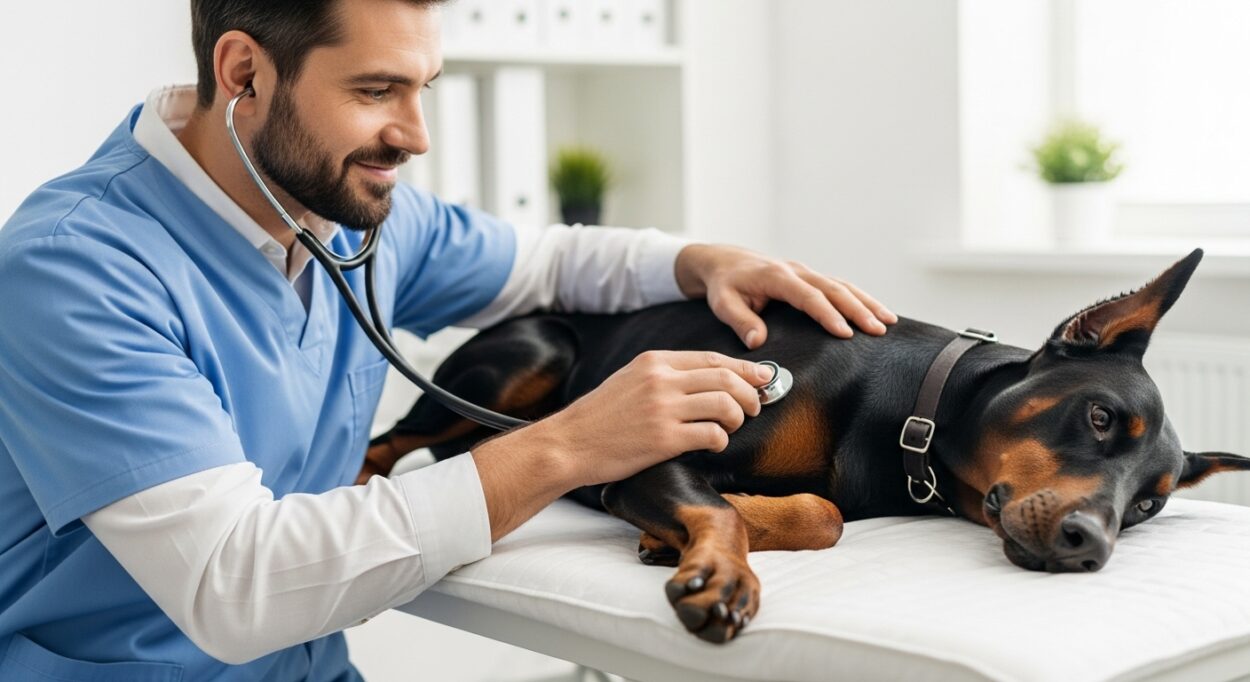Table of Contents
Introduction
Strong, loyal, and always alert—the Doberman pinscher is truly one of the smartest and most loving breeds you can welcome into your family. But with their athletic build and energetic personality come some unique health risks that every owner needs to watch for. Whether you’re a first-time Doberman parent or an experienced dog owner, understanding common doberman dog health problems is crucial for keeping your pup happy and healthy.
In this guide, we’ll break down the top 5 health issues seen in Dobermans, their most common signs, prevention tips, and when to call the vet. Let’s get started!

1. Dilated Cardiomyopathy (DCM)
What it is:Dilated Cardiomyopathy (DCM) is a serious heart disease that’s unfortunately common in Dobermans. The heart becomes enlarged and can’t pump blood effectively, which can lead to heart failure.
Early warning signs:
- Lethargy or weakness
- Coughing, especially at night
- Shortness of breath or rapid breathing
- Fainting spells
Prevention & expert tips:
- Ask your vet to perform a yearly heart check (including echocardiograms)
- Keep your Doberman at a healthy weight
- Feed high-quality dog food that meets vet recommendations
- Get regular exercise—but nothing too intense in hot weather
When to call the vet:If your dog seems extra tired or you notice coughing or fainting, don’t wait—call your vet immediately.

2. Hip Dysplasia
What it is:Hip dysplasia is a genetic condition where the hip joint doesn’t fit together properly. This can cause pain, limping, and early arthritis. Dobermans, especially when young, can be at risk.
Common symptoms:
- Stiffness, especially after exercise or naps
- Favoring one leg
- Difficulty standing up or jumping
Prevention & care:
- Only buy Doberman puppies from ethical breeders who test for hip health
- Keep your dog at a healthy weight to reduce joint stress
- Provide soft bedding and, if needed, joint supplements (ask your vet!)
When to call the vet:If your Doberman shows any signs of pain or struggles to move, it’s time for a professional check-up.

3. Von Willebrand’s Disease
What it is:Von Willebrand’s Disease is a blood clotting disorder seen in Dobermans. It means their blood doesn’t clot properly after injuries, which can lead to excessive bleeding.
What to watch for:
- Nosebleeds or gum bleeding
- Blood in urine or stool
- Unusual bruising
Prevention & testing:
- Talk to your breeder and vet about genetic testing for this disease
- Inform your vet before any surgeries or dental cleanings
When to call the vet:If your Doberman has a bleeding incident that takes longer than usual to stop, call the vet.

4. Hypothyroidism
What it is:Hypothyroidism happens when your dog’s thyroid gland doesn’t make enough hormones. This can cause your Doberman to gain weight, lose hair, and just seem “off.”
Warning signs:
- Sudden weight gain not linked to overfeeding
- Thinning coat or skin infections
- Sluggishness or depression
Prevention & treatment:
- Yearly bloodwork at your vet can spot thyroid issues early
- Hypothyroidism is treatable with daily medication—most dogs live happily with it!

5. Wobbler Syndrome
What it is:Wobbler Syndrome (Cervical Vertebral Instability) affects the neck and spine, causing unsteady walking and sometimes neck pain. Dobermans are prone to this as they age.
Key symptoms:
- Wobbly or uncoordinated walk
- Weakness in legs, often worsening over time
- Neck stiffness or pain
Prevention tips:
- Maintain a healthy weight
- Avoid strenuous play, especially with young, growing Dobermans
- Prompt vet care at any sign of weakness or wobbling
When to see a vet:If your pup starts showing any “wobbling” or weakness, get them checked out ASAP for the best chances of a good outcome.

Quick Tips to Keep Your Doberman Healthy
- Schedule regular vet checkups (yearly or as recommended)
- Maintain a balanced diet and healthy weight
- Get enough daily exercise—but avoid overdoing it, especially in puppies
- Watch for any odd changes and trust your instincts
Frequently Asked Questions (FAQs)
1. How long do Dobermans usually live?
Dobermans usually live between 10–12 years. Good health care and regular vet visits can help them reach the upper end of this range.
2. Are Dobermans prone to cancer?
Yes, like many larger breeds, Dobermans can be at risk for certain cancers such as lymphoma or osteosarcoma, especially as they age.
3. Can these health issues be prevented entirely?
Some, like von Willebrand’s Disease and hip dysplasia, are largely genetic but can be minimized through careful breeding and early veterinary care. Regular checkups help catch problems early.
4. Should I get pet insurance for my Doberman?
Because of their susceptibility to health problems, pet insurance is a smart idea for Doberman owners—it can help cover expensive treatments.
5. What should I do if my Doberman seems unwell?
If you notice any unusual symptoms or behaviors, it’s always best to consult your vet right away. Early treatment saves lives!
Final ThoughtsDobermans are amazing companions, but they need dedicated care and attention to stay healthy. By knowing the top doberman dog health problems, keeping up with routine checks, and acting quickly at any sign of a problem, you can help your beloved dog live their best life.



